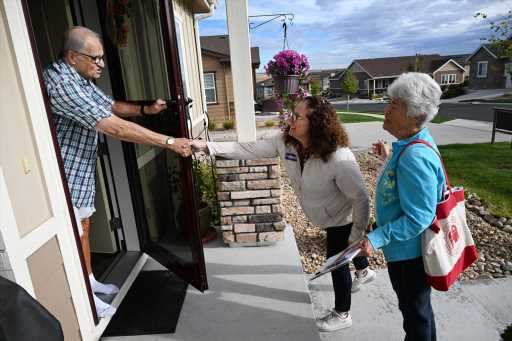Colorado secretary of state: How Jena Griswold, Pam Anderson differ
The incumbent candidate for secretary of state says she believes in being outspoken about election conspiracy theories and fundamental rights across the country, but her GOP opponent says the Democrat is polarizing and not fulfilling the duties of her office.
Secretary of State Jena Griswold, who worked as a voter protection attorney during Barack Obama’s 2012 campaign, squared off with Pam Anderson, the former Jefferson County clerk and a business owner, at a debate Tuesday night.
Colorado voters had decidedly rejected election-denier and Mesa County clerk Tina Peters in the GOP primary for secretary of state in June, instead opting to advance Anderson as the Republican candidate for the seat.
“I think a lot of clerks are relieved Tina Peters didn’t win her election,” Matt Crane, executive director of the Colorado County Clerks Association, told The Denver Post earlier this month.
“Her lies, her dishonesty, her illegal behavior, the violation of her oath have had a really catastrophic effect on the public confidence in elections and on election administrators.”
Unlike Peters, Anderson has repeatedly said she believes in the 2020 election results and does not ascribe to the so-called “Big Lie.” But on Tuesday night, Griswold pushed back against Anderson for campaigning with other Republican candidates who do not believe Joe Biden won the 2020 election.
“The Big Lie is fueling the insider threats,” Griswold said. “The Big Lie is fueling why the county clerk in Chaffee County works behind bulletproof glass. The Big Lie is why election deniers are talking about firebombing dropboxes. Pam, as a candidate for secretary of state, I think it’s inappropriate to campaign with election deniers spreading the Big Lie.”
WATCH: Colorado secretary of state, treasurer candidates debate
The debate was tense at times as Anderson pressed Griswold for what she called her hyperpartisanship of the office and using the investigations into Peters — which Anderson said she supported — as campaign fodder for her re-election. She also accused Griswold of not taking accountability for mistakenly sending out 30,000 postcards to noncitizens reminding people to register to vote. The data error occurred for the second time under Griswold’s tenure (although the postcards noted that only citizens can register to vote).
“Let’s be clear,” Anderson said. “When I made a mistake, I stood up in front of the special district board with my staff. I didn’t use them as a shield for my political career. I took accountability for it. And that’s what leadership is. You stand up when it’s easy and hard.”
The race drew significant attention and money nationally when Peters was in the running for a seat that would not have made much of a public splash in prior years. Although that has since died down and the two Colorado candidates agree on many of the issues at play, it has not prevented what’s going on nationally from remaining part of the discourse.
“Telling the truth isn’t being partisan. It’s telling the truth,” Griswold said.
“Colorado has safe and secure elections. But for those trying to divide this country, to destabilize the country, to suppress the vote, we need folks to speak up. My job as secretary of state is protecting the right to vote,” she added.
Griswold said in an interview that her No. 1 goal is to protect election infrastructure and increase access for Coloradans to vote — issues she has worked on over the past four years. She has worked with lawmakers to pass legislation on election security and banning open carrying of guns near ballot processing.
Although she refers to Colorado’s elections as the “gold standard,” she said she wants to continue working on those issues if reelected, including ensuring Native American tribal members have increased access to voting, innovating and responding to election threats and reforming the campaign finance system.
“Outside of being the only candidate who has overseen statewide elections … it was record turnout and who has led our state during these last few years and has expanded access, I’m also a very unique candidate in that I grew up in rural Colorado, on and off of food stamps, going to food banks, first in my family to go to college and then to law school. That’s why I am so focused on making sure that we’re standing up for fundamental rights and the fundamental right to vote,” she said.
Anderson told The Denver Post she doesn’t like to refer to Colorado’s elections as the “gold standard,” despite her pride and confidence in Colorado’s election system, partly because it “implies we’re done.” There are some systems that she said county clerks use as best practices that could be made consistent across the state, such as “quality assurance audits” for every election. If elected, she also wants to consider updating technological systems to improve processes, balance increased voter access with best practices to ensure that accuracy can be validated and start a citizens’ election academy so voters can learn about the process and become ambassadors for others.
But if elected, her first priority, she said, will be “restoring confidence through a professional code of ethics.”
Source: Read Full Article

